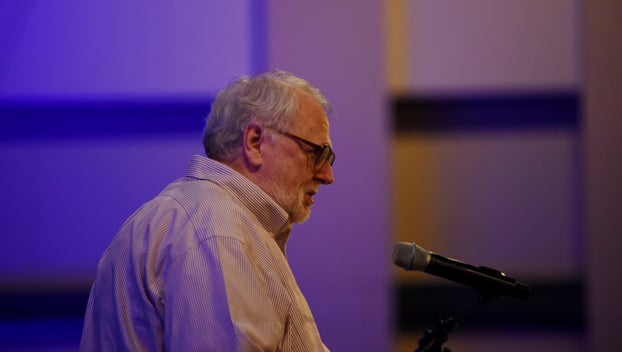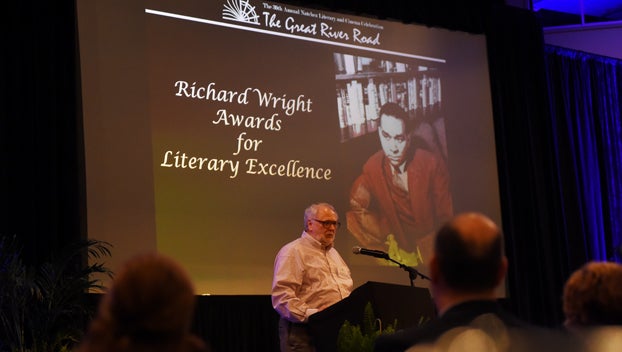2 receive Richard Wright Award for Literary Excellence
Published 1:21 am Sunday, February 24, 2019
NATCHEZ — Organizers said they were pleased with the turnout for this year’s 30th Annual Natchez Literary and Cinema Celebration that wrapped up Saturday evening after three-days at the Natchez Convention Center.
The event that kicked off Thursday night with screenings of the documentary films “Mississippi Madam: The Life of Nellie Jackson” and portions of an upcoming documentary titled “Women of the Struggle, included presentations from such authors as Mississippi poet laureate Beth Fennelly, Tom Franklin and Michael Twitty.
A highlight of Saturday’s events was the presentation of the annual Richard Wright Awards for Literary Excellence. Past winners include Eudora Welty, Margaret Walker Alexander, Shelby Foote, Ellen Douglas, Willie Morris, Richard Ford, Barry Hannah, John Grisham, Bill Minor and Greg Iles to name a few.
This year’s Richard Wright Award recipients were Jack Elliott Jr., a retired Associated Press editor and bureau chief and Howard Bahr, an award-winning novelist and former creative writing professor at Belhaven University in Jackson.
Novelist Ellen Gilcrest had been scheduled to receive a Richard Wright Award this year, but had to back out of the event for personal reasons, organizers said, adding they hope to be able to present the award to Gilcrest next year.
The Richard Wright Award is presented each year to two outstanding writers honoring their body of work, said Teresa Busby, vice president of Copiah-Lincoln Community College Natchez campus.
Chris Goodwin, chairman of the Richard Wright Award selection committee and director of public information for the Mississippi Department of Archives and History, presided over the awards ceremony held Saturday morning at the convention center.
“There are no two more deserving recipients than this year’s winners,” Goodwin said. “Jack Elliott Jr. spent more than 30 years with the Associated Press covering a wide variety of news stories from politics to legal cases, executions and natural disasters. …”
Elliott, a Kentucky native, moved to Forest (Mississippi) with his family when he was 4 years old, Goodwin said. Elliott went on to graduate from the University of Southern Mississippi before working in public relations, as a reporter for newspapers including the Meridian Star, The Clarion-Ledger and The Jackson Daily News before going to work for the Associated Press from which he retired as the Jackson bureau chief in 2015.
In accepting the award Saturday, Elliott said he initially wanted to become a lawyer when he went to college. He stumbled into a journalism 101 course, however, and after touring the student newspaper office with his advisor, Jim Bishop, Elliott said he decided a career in newspapers was for him.
“I discovered watching that press run and working on that typewriter and having your printed ideas down on a piece of paper was wonderful,” Elliott said.
The newspaper business, Elliott said, was fulfilling.
“I spent a lot of time traveling around Mississippi,” Elliott said, “and this was a business — and to me this is a business — that was wonderful, fulfilling and learning every day, because you never knew where you were going to be.
“One day you would be in what was left of a trailer park, talking to a wife or a husband who lost everything and you would turn around a couple of weeks later and be interviewing the king of Spain who was in Jackson, Mississippi, to dedicate an art exhibit, and then you would be up in Parchman for an execution of someone who brutally murdered someone … but there is an ever-changing story, ever-changing ideas of what you were going to be running into.”
Elliott said he was grateful to receive the award.
“I want to thank you all for this,” Elliott said. “This is a wonderful occasion, and I was looking at the list of past winners of this award and they truly are the giants of the arts in Mississippi in all the mediums and just to get a very small part of that and also be on that list is absolutely wonderful. I thank you very much.”
Howard Bahr is a Meridian native, whose award-winning fiction is informed by his experience in the United States Navy, and his work on the railroad, Goodwin said in introducing Bahr, who holds bachelor’s and master’s degrees from the University of Mississippi.
Bahr also served as curator of William Faulkner’s Rowan Oak house museum in Oxford before teaching creative writing in Tennessee and later at Belhaven University.
Bahr made his reputation with three novels about the American Civil War, Goodwin said, “The Black Flower” in 1997, “The Year of the Jubilo” in 2000 and “The Judas Field” in 2006.
Bahr said he had a great time teaching creative writing at Belhaven College for nine years.
At the beginning of each semester, Bahr said, he used to give his students a print out titled “Random Advice From Uncle Howard.”
One point Bahr said he wanted students to remember is “that as an artist you are a vessel and no more. Whatever talent you have was given to you by God or the muses or by the great cosmic lottery, whatever you choose to believe.
“In any case, accept the fact that talent is not the result of something that you have done. You are merely the steward of your talent and thus your talent should be taken seriously, just as your work should be taken seriously. On the other hand, never take yourself too seriously. You should be proud of your work but never think it makes you superior to other persons. Recognize that every creative act is sacred, whether it be writing a novel, painting a picture … restoring a ’57 Chevrolet, every creative act binds the perpetrator by a golden thread to the ultimate creator of all. So celebrate your brothers and sisters, whatever their work might be and keep your ego in check.
“And, they would say, ‘Is this going to be on the test?’” Bahr said to laughter from the audience. “It is in that spirit that I accept this award with much gratitude.”
Bahr went on to read passages from a novel he is working on about the Korean War in the 1950s.
Bahr said receiving the Richard Wright Award was a great honor.
“It is not for something I have done,” Bahr said, “but for the work. Remember the work, not the artist.”









